To wrap up our little Vienna unit, we’d like to share this clip with you which sums up our favorite highlights during our lovely Vienna 2022 trip!
Baba Wien, see you next year! 🙂
Music: www.bensound.com
Video credit: Durden Dickinson Bremen Program

To wrap up our little Vienna unit, we’d like to share this clip with you which sums up our favorite highlights during our lovely Vienna 2022 trip!
Baba Wien, see you next year! 🙂
Music: www.bensound.com
Video credit: Durden Dickinson Bremen Program
by Amanda Sorensen ’23 and Mac Tambussi ’23
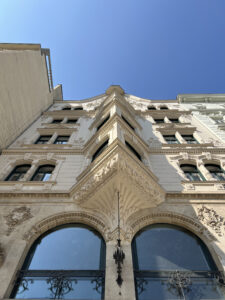
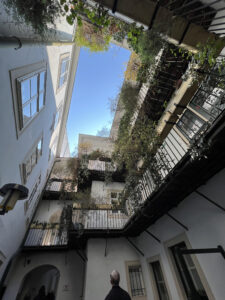
“I really enjoyed the architecture throughout Vienna. The Nationalbibliothek, Stephansdom, and Schönbrunn Palace were absolutely stunning, but what I loved most was wandering through the small streets and stumbling upon beautiful churches and colorful facades of beautifully constructed buildings.” (Amanda Sorensen)
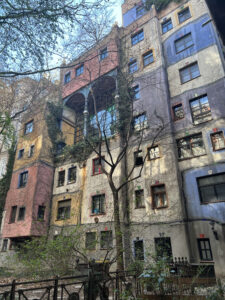
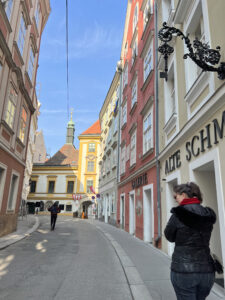
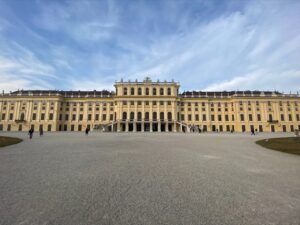 “Vienna was awesome. I have always heard and learned about how beautiful Vienna is, in class, movies, and books, but I they really don’t do it justice. Vienna took my breath away. It had a rich history with the Habsburgs and have a beautiful skyline and architecture. I really enjoyed trying traditional Wiener Schnitzel. What I enjoyed most of all, which came as a shocker to me, was the opera. The show was called
“Vienna was awesome. I have always heard and learned about how beautiful Vienna is, in class, movies, and books, but I they really don’t do it justice. Vienna took my breath away. It had a rich history with the Habsburgs and have a beautiful skyline and architecture. I really enjoyed trying traditional Wiener Schnitzel. What I enjoyed most of all, which came as a shocker to me, was the opera. The show was called “Die Entführung aus dem Serail.” Despite our not-so-great seats, I thought the opera was electric. Vienna really was an awesome excursion!” (Mac Tambussi)
“Die Entführung aus dem Serail.” Despite our not-so-great seats, I thought the opera was electric. Vienna really was an awesome excursion!” (Mac Tambussi)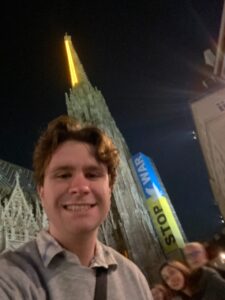
Photo credit: Durden Dickinson Bremen Program
by Kathryn Baker ’23 and Nicholas Rickert ’23
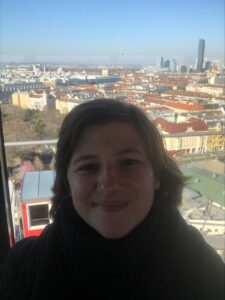 “My favorite part of our Wien excursion was exploring Prater Park! It is a large amusement park that is open 24 hours. One of the most famous landmarks in Wien is the Wiener Riesenrad (ferris wheel). We rode the Riesenrad and saw some of the most beautiful views of the city. After riding the Riesenrad, some of us walked around the park and got some food. I ate another Schokoapfel (apple covered in chocolate) and ice cream. I was surprised at how many ‘scary, haunted’ rides there were at Prater, there were at least five! Overall this is one of my favorite memories.” (Kathryn Baker)
“My favorite part of our Wien excursion was exploring Prater Park! It is a large amusement park that is open 24 hours. One of the most famous landmarks in Wien is the Wiener Riesenrad (ferris wheel). We rode the Riesenrad and saw some of the most beautiful views of the city. After riding the Riesenrad, some of us walked around the park and got some food. I ate another Schokoapfel (apple covered in chocolate) and ice cream. I was surprised at how many ‘scary, haunted’ rides there were at Prater, there were at least five! Overall this is one of my favorite memories.” (Kathryn Baker)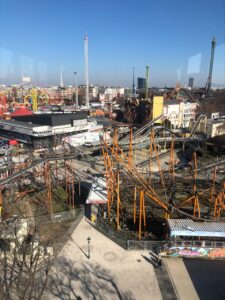
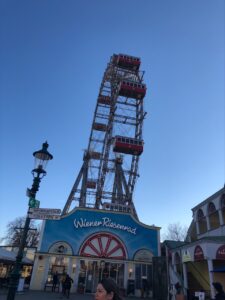
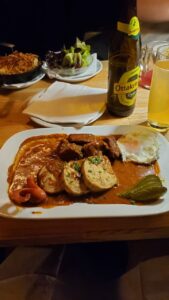 “Trying regional dishes and the enjoying unique local atmospheres in restaurants always leave me with positive and lasting impressions of a foreign city, and Vienna was no exception. Our group had the pleasure of being taken to dine in excellent traditional restaurants as well as Vienna’s famous ‘Cafe Demel,’ where I fell in love with a sweet dish called ‘Kaiserschmarrn’ which is like a pancake but much more delectable. Other highlights for me were the Viennese potato salad, Goulash, and of course Wiener Schnitzel. Combined with the lovely decor and a fine selection of beer, I don’t think I’ll be able to forget the restaurants!” (Nick Rickert)
“Trying regional dishes and the enjoying unique local atmospheres in restaurants always leave me with positive and lasting impressions of a foreign city, and Vienna was no exception. Our group had the pleasure of being taken to dine in excellent traditional restaurants as well as Vienna’s famous ‘Cafe Demel,’ where I fell in love with a sweet dish called ‘Kaiserschmarrn’ which is like a pancake but much more delectable. Other highlights for me were the Viennese potato salad, Goulash, and of course Wiener Schnitzel. Combined with the lovely decor and a fine selection of beer, I don’t think I’ll be able to forget the restaurants!” (Nick Rickert)
Photo credit: Durden Dickinson Bremen Program
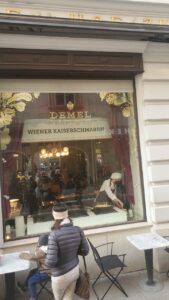
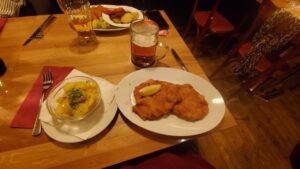
by Shannon Vogel ’23, Andrew Irvine ’23 and Evan Bates ’23
“The National Library was my favorite place we visited. The architecture and the amount of books felt straight out of a movie, and fit my dream image of the perfect library (complete with bookcase doors!) It was also interesting to learn that it was one of the first German language public libraries.” (Shannon)
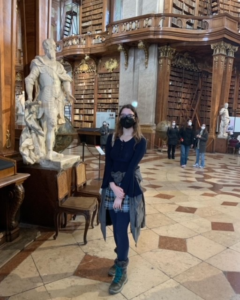

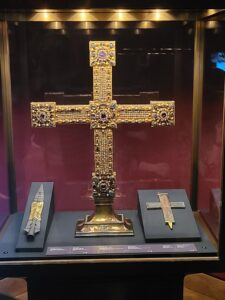 “On the first day of the excursion in Vienna, the group visited the Schatzkammer (Treasure Chamber) of Austria. Within the chamber lay centuries’ worth of priceless artifacts from various points of Austrian history. Some of the items included were coronation robes, tapestries, ceremonial swords with their sheaths, reliquaries of various saints and of religious items, and of course the crowns of various Holy Roman Emperors. Unfortunately, the Imperial Crown, believed to have been made for Otto I. (the Great) around 960 and later painted into a picture of the earlier Charlemagne (Karl der Große) who was crowned in 800, was off display for research purposes. Regardless, the treasures of Austria were an astounding journey through a millennium of history.” (Andrew)
“On the first day of the excursion in Vienna, the group visited the Schatzkammer (Treasure Chamber) of Austria. Within the chamber lay centuries’ worth of priceless artifacts from various points of Austrian history. Some of the items included were coronation robes, tapestries, ceremonial swords with their sheaths, reliquaries of various saints and of religious items, and of course the crowns of various Holy Roman Emperors. Unfortunately, the Imperial Crown, believed to have been made for Otto I. (the Great) around 960 and later painted into a picture of the earlier Charlemagne (Karl der Große) who was crowned in 800, was off display for research purposes. Regardless, the treasures of Austria were an astounding journey through a millennium of history.” (Andrew)
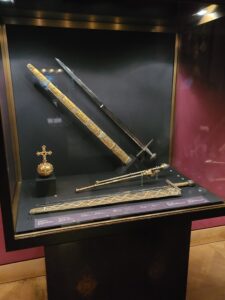
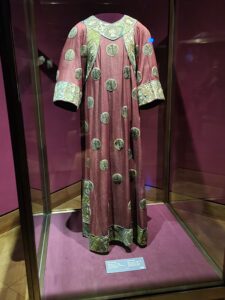
“One of my favorite attractions in Vienna might have been the Kaisergruft (the imperial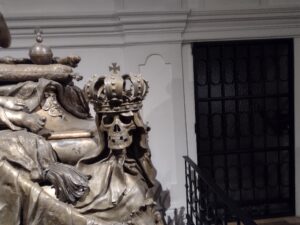 crypt of the Habsburg family). It was certainly odd to walk amongst the sarcophagi of ancient rulers but the sheer opulence and uniqueness of each coffin struck me. I think of all the decorations on the coffins, the skulls and figures were my favorite. They were wonderfully macabre, sometimes with wings or the cast crowns of their long since fallen domains. I was also quite interested in the fact that the family separated
crypt of the Habsburg family). It was certainly odd to walk amongst the sarcophagi of ancient rulers but the sheer opulence and uniqueness of each coffin struck me. I think of all the decorations on the coffins, the skulls and figures were my favorite. They were wonderfully macabre, sometimes with wings or the cast crowns of their long since fallen domains. I was also quite interested in the fact that the family separated 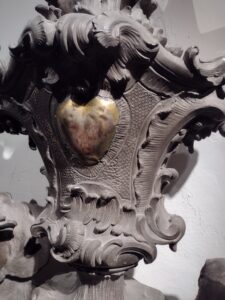 their organs to send to their family or original kingdom like the heart container in the picture here. The biggest coffin was for 2 rulers and was so large it had it’s own room and had to be lowered from the street above and the roof built above it. There are even modern burials here with one even from 2011 I believe. Certainly a lovely visit for those who love skulls and grim things. I heartily recommend.” (Evan)
their organs to send to their family or original kingdom like the heart container in the picture here. The biggest coffin was for 2 rulers and was so large it had it’s own room and had to be lowered from the street above and the roof built above it. There are even modern burials here with one even from 2011 I believe. Certainly a lovely visit for those who love skulls and grim things. I heartily recommend.” (Evan)
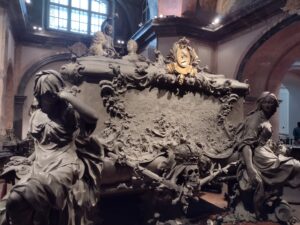
All pictures taken and provided by students or Dickinson staff.
by Brendan Harlan ’22
A while ago, before the COVID numbers were spiking, I was lucky enough to see a Werder Bremen soccer match.
Going to a Werder Bremen game was on my bucket list of things to do while in Bremen and I’m incredibly glad that I got the opportunity to see Werder play. Words cannot describe how crazy experiencing a Werder game was for me. I’ve been to Red Sox – Yankees games before, where there’s a certain level of excitement and tension amongst the fans, but the atmosphere at Weserstadion and the experience of being amongst diehard Fußball fans was incomparable.
Video credit: Durden Dickinson Bremen Program
Hallo from beautiful Heidelberg! This year’s Dickinson in Bremen students, Kathryn Baker ’23 and Brendan Harlan ’22 spent all of September doing intensive language courses in Heidelberg, Germany as a part of the Durden Dickinson in Bremen (DiB) program. Students typically choose the city in which they do an initial four week language program, but due to the COVID-19 pandemic, a course in Heidelberg was found this year for Kathryn and Brendan.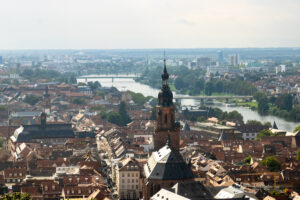
Heidelberg is known for its medical community and historic city center. The Altstadt, an old section of the city established in the Romantic time period, has been largely preserved. The Schlossruine (castle ruins) tower above the Altstadt, while the Alter Brücke (old bridge) leads across the Neckar River to the the Philosophenweg (Philosopher’s Way), where key historical German figures have walked in the past, such as Johann Wolfgang Goethe.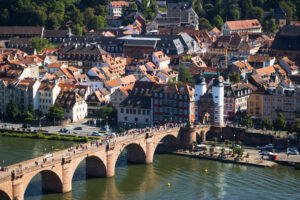
Kathryn and Brendan had a great time exploring Heidelberg and appreciated the chance to begin their German immersion experience through exploring the city and engaging in their language classes. Both would love to return to the city again (especially because Brendan misses his favorite coffee shop, Kaffeezimmer, while Kathryn misses the croissants at Rieglers).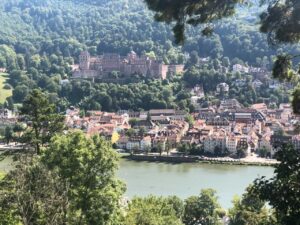
Germany is opening up, and people are planning their vacation. We are hoping to explore sites and places with our students, rich in culture and history as well as vibrant and lively in the present. Here are some pictures from one of the trips we did to nearby Hamburg and Lübeck:
This video features the song “Happiness” by Bensound, available under a Creative Commons license.
 At the Rhododendronpark in Bremen, visitors get to enjoy one of the largest collection worldwide of these unusual, beautiful flowers: The park offers over 1,000 types of Rhododendron and Azalea bushes stretched over 46 hectares of parkland!
At the Rhododendronpark in Bremen, visitors get to enjoy one of the largest collection worldwide of these unusual, beautiful flowers: The park offers over 1,000 types of Rhododendron and Azalea bushes stretched over 46 hectares of parkland!
We highly recommend you to visit the park in the month of May: During this time of year, the Rhododendron starts to come into full bloom and shows its many vibrant colors.
For more information visit: https://www.rhododendronparkbremen.de/
Photo: Heinz-Josef Lücking, Creative Commons licence CC BY-SA 3.0 DE
After a couple of rough snowy winter-weeks, spring has already arrived in Bremen! If you want to see how blooming Bremen looks like during this season, you should take a look at BREMENbewegt‘s “Frühling in Bremen” video which features the city’s most beautiful places: der Bürgerpark, die Wallanlagen, der Rhododendronpark, der Marktplatz and more. Where would you like to enjoy the warming sun the most?
Source: https://www.youtube.com/watch?v=H0cRuQWKmnw&ab_channel=BREMENbewegt